In sewing, the thread is the silent backbone, holding together the fabric pieces that form the foundation of any project.
The essence of a successful sewing endeavour lies not just in the stitches but in the strength of the thread that weaves them.
A strong sewing thread goes beyond its mere functional role, becoming a crucial determinant of a project’s durability and resilience.
From choosing materials like cotton, polyester, and nylon to considerations of thickness, twist, and ply, understanding what makes a sewing thread strong is paramount.
Join us as we unravel the intricacies of this fundamental sewing component and discover the artistry behind crafting resilient and enduring stitches.
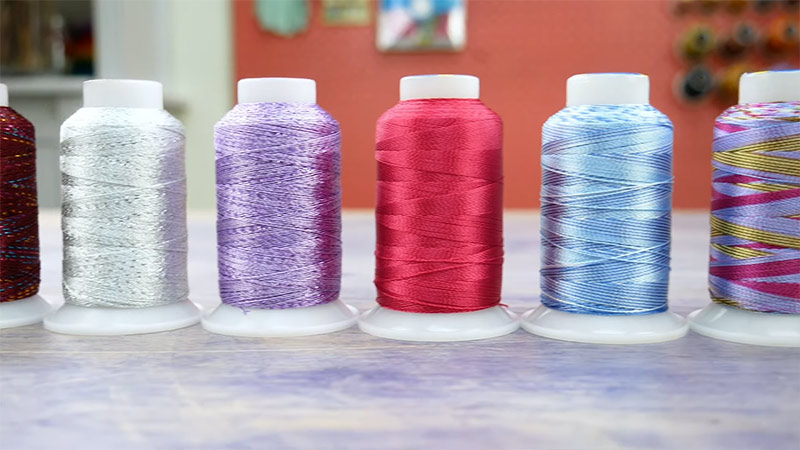
What Is a Strong Sewing Thread?
A strong sewing thread embodies resilience, which is crucial for the integrity and longevity of stitched creations. Its strength, influenced by material, thickness, twist, and ply, determines its suitability for diverse projects.
Nylon threads offer high tensile strength, polyester combines strength with durability, and Kevlar excels in extreme conditions. The choice depends on project requirements, whether heavy-duty outdoor gear or delicate embroidery.
Recognizing the artistry behind thread selection ensures that every stitch withstands tension, abrasion, and wear, transforming fabric into enduring, reliable, and visually pleasing creations that stand the test of time.
What Makes a Sewing Thread Strong? 8 Elements
Several factors contribute to the strength of a sewing thread. Understanding these factors can help you choose the right thread for your sewing project.
Here are the key elements that make a sewing thread strong:
1. Material
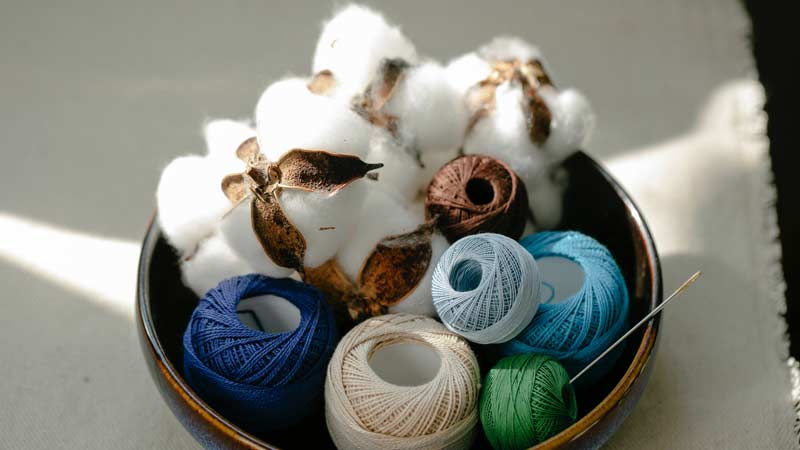
The choice of material significantly impacts a thread’s strength. Cotton is natural, soft, and breathable but can shrink and fade.
Polyester is synthetic, durable, and resistant to heat and abrasion. Nylon offers strength and elasticity but is affected by sunlight and chemicals.
Silk is natural, smooth, and shiny but can be delicate and expensive. Rayon, being semi-synthetic, is lustrous and colourful but may be weaker.
2. Thickness (Weight or Tex)
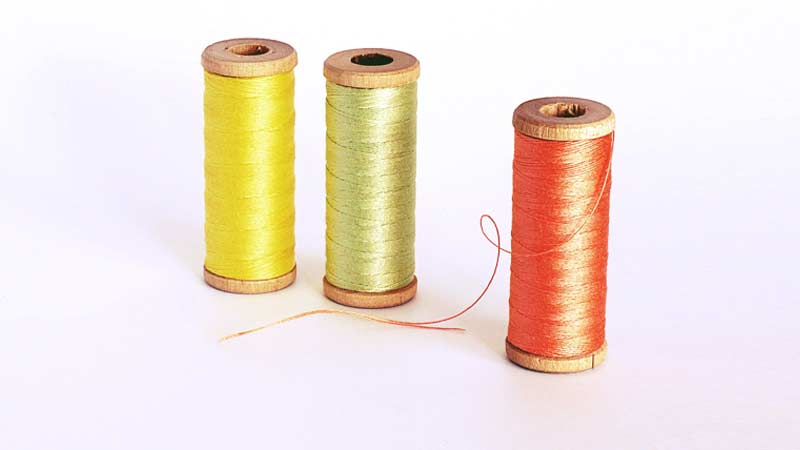
Thicker threads generally provide more strength. Thickness is measured by weight (grams per 1000 meters) or tex (grams per 1000 meters).
Thicker threads are suitable for heavy-duty projects, but careful consideration is needed to avoid excess bulk in seams.
3. Twist (TPI/TPM – Turns Per Inch/Turns Per Meter)
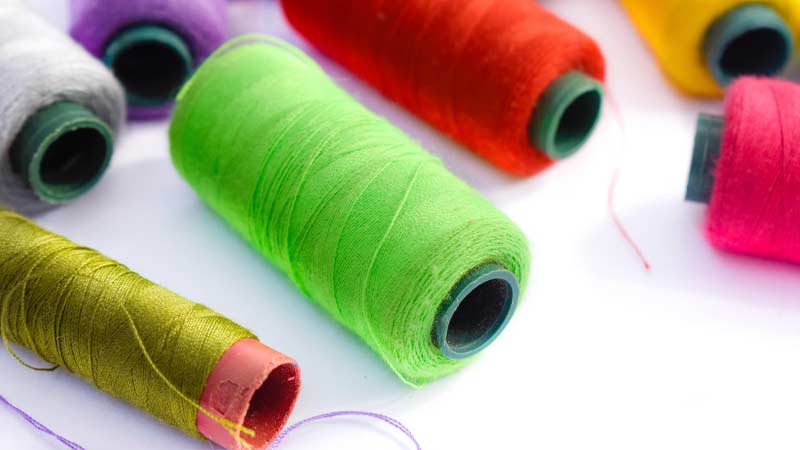
The twist in a thread, measured in turns per inch or turns per meter, affects strength. A higher twist results in a tighter thread that is more fraying-resistant. However, excessive twists can lead to increased tension and curling in seams.
4. Ply
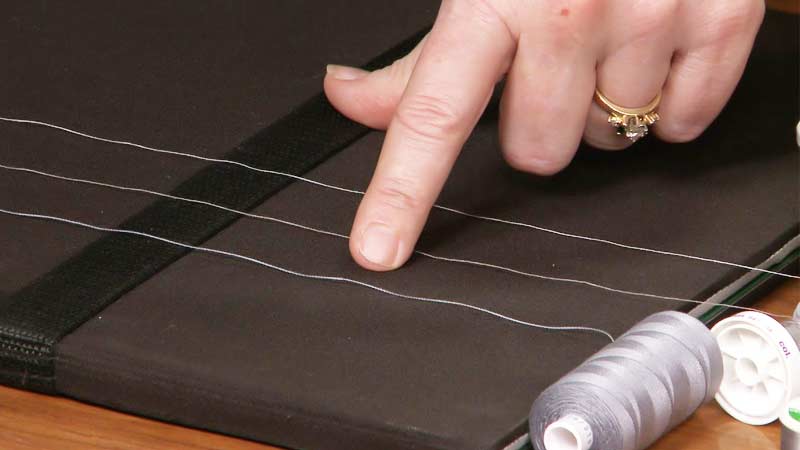
Ply refers to the number of strands twisted together to form a single thread. Higher-ply threads are generally thicker and stronger but may add stiffness and bulk to seams. The choice of ply depends on the specific requirements of the sewing project.
5. Color and Dye
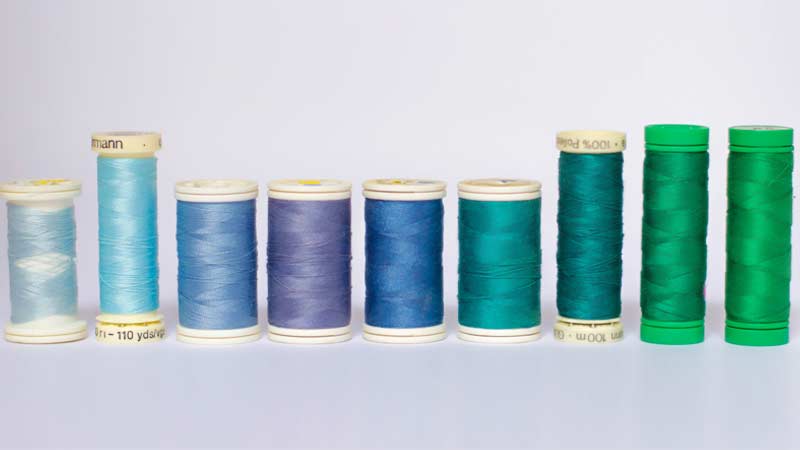
While not directly related to strength, the color and dye used in a thread can influence its performance. Some dyes or colors may impact the thread’s longevity, especially under prolonged exposure to sunlight or harsh washing conditions.
6. Quality of Manufacturing
The overall quality of the manufacturing process, including the spinning and twisting of fibers, is crucial for consistent thread strength. Well-manufactured threads are more reliable and durable.
7. Intended Use
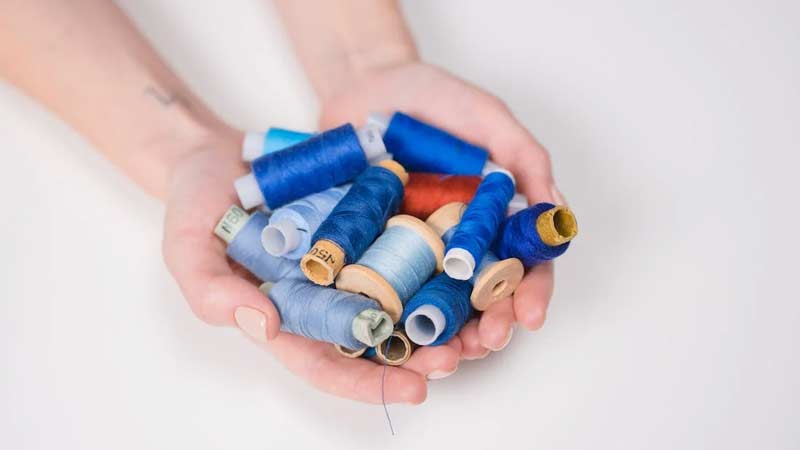
Choosing a thread based on its suitability for the intended use of the final product is essential. Heavy-duty projects require stronger threads, while delicate fabrics or decorative stitching may benefit from finer threads.
8. Environmental Factors
Consideration of environmental conditions is vital. Threads exposed to sunlight, moisture, or chemicals may need specific properties to maintain strength and durability. Selecting threads that match the environmental conditions of use ensures long-lasting results.
Benefits of Using Strong Sewing Thread
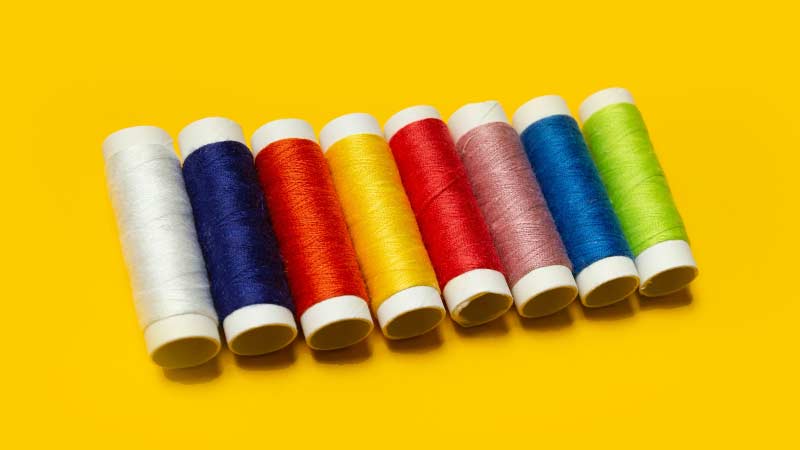
Using a strong sewing thread offers several benefits that contribute to your sewing projects’ overall success and durability. Here are some advantages:
Enhanced Durability
Strong threads are more resistant to breaking and fraying, providing greater durability to the seams of your projects. This is especially crucial for items subject to wear and stress.
Improved Stitch Integrity
Strong threads contribute to better stitch integrity, ensuring the stitches hold firmly without unraveling or coming loose. This is essential for the longevity of your creations.
Suitability for Heavy-Duty Projects
Strong threads are well-suited for heavy-duty or outdoor projects like sewing denim, canvas, or upholstery. They can withstand the extra strain and pressure associated with these materials.
Reduced Risk of Puckering
Strong threads help maintain even tension in stitches, reducing the likelihood of puckering or gathering in the fabric. This is particularly important for achieving a professional and polished appearance.
Enhanced Resistance to Abrasion
Threads with higher strength are generally more resistant to abrasion, making them suitable for projects undergoing friction, rubbing, or constant use without deteriorating quickly.
Greater Sewing Versatility
Strong threads provide versatility, allowing you to tackle a wide range of fabrics and projects confidently. Whether working with delicate materials or heavy fabrics, a strong thread adapts to different sewing requirements.
Support for Decorative Stitches
Strong threads ensure that intricate designs remain intact over time, adding beauty and durability to your projects when engaging in decorative stitching or embellishments.
Prevention of Thread Breakage
Strong threads are less prone to breakage, reducing interruptions during the sewing process. This promotes a smoother and more efficient workflow, especially when dealing with complex or time-sensitive projects.
Longevity of Finished Products
Items sewn with strong threads tend to have a longer lifespan, retaining their structural integrity and appearance even after repeated use and washing.
Reliable for Machine Sewing
Strong threads are well-suited for machine sewing, where the threads undergo tension, friction, and rapid movements. This reliability ensures consistent and high-quality stitching.
Resistance to Environmental Factors
Strong threads are often better equipped to withstand environmental factors such as sunlight, moisture, and temperature variations, ensuring that the thread and seams remain intact.
Top 5 Strongest Sewing Thread
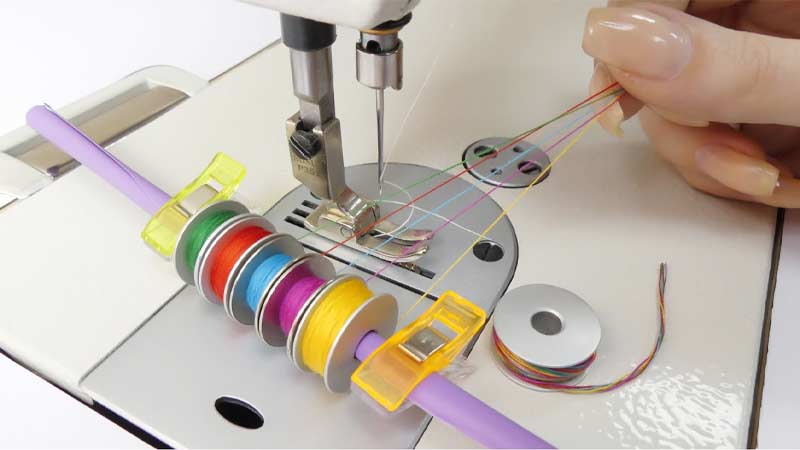
Determining the “strongest” sewing thread depends on various factors, including the material’s characteristics, the project’s requirements, and the specific type of strength needed (tensile strength, abrasion resistance, etc.).
However, some threads are generally recognized for their strength in different contexts:
1. Nylon Thread
Nylon threads are known for their high tensile strength and durability. They are resistant to abrasion, making them suitable for heavy-duty projects like outdoor gear, upholstery, and leatherwork.
2. Polyester Thread
Polyester threads are widely appreciated for their strength, resilience, and resistance to fading. They suit various projects, including apparel, quilting, and home decor.
3. Kevlar Thread
Kevlar is an exceptionally strong and heat-resistant material often used in industrial applications. Kevlar threads are suitable for projects that require extreme strength, such as heavy-duty outdoor gear or industrial sewing.
4. Upholstery Thread
Threads specifically designed for upholstery, often made of polyester and nylon, are known for their strength and resistance to wear. These threads are ideal for sewing furniture and automotive upholstery.
5. Coats Dual Duty XP Thread
Dual Duty XP is a polyester-wrapped core-spun thread that combines the strength of polyester with the softness of cotton. It’s suitable for various projects, balancing strength and flexibility well.
How to Choose the Right Thread for Your Project?
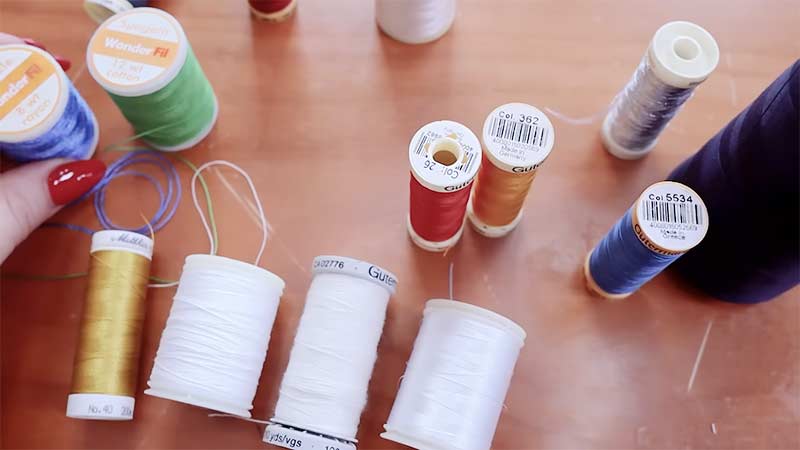
Choosing the right thread for your sewing project is crucial for achieving the desired results in terms of both appearance and durability.
Here’s a step-by-step guide on how to choose the right thread:
Consider the Fabric
Match the thread material to the fabric. For example, use cotton thread for cotton fabric, polyester for polyester, etc. This ensures compatibility and prevents issues like uneven wear or color bleeding.
Evaluate Weight or Tex
Match the thread weight or tex to the fabric weight. Thicker threads work well with heavy fabrics, while finer threads suit lighter materials. This prevents puckering or sagging in the seams.
Assess Color and Appearance
Choose a thread color that complements or contrasts with the fabric. Ensure the thread’s color won’t bleed or fade over time. Consider using variegated or specialty threads for decorative stitching to enhance the project’s visual appeal.
Consider Stretch and Elasticity
If working with stretchy or elastic fabrics, use threads designed for elasticity. This helps prevent breakage or snapping in the seams, especially in projects like activewear or lingerie.
Evaluate the Sewing Technique
Tailor the thread choice to your sewing technique. Opt for a strong and durable thread for heavy-duty projects like denim or canvas. Delicate projects, like lace or embroidery, benefit from smoother and finer threads.
Select the Right Needle
Match the thread to the appropriate needle size and type. Thinner threads require smaller needles, while thicker threads need larger needles. Use ballpoint needles for knit fabrics and sharp needles for woven fabrics.
Assess Environmental Factors
Consider where the finished product will be used. If it will be exposed to sunlight or moisture, choose threads that resist fading, weakening, or rotting.
Think About Ease of Use
Evaluate the thread’s ease of use on your sewing machine. Threads that work well with your machine and require fewer tension adjustments can smooth the sewing process.
Special Considerations for Decorative Stitching
Choose specialty threads like metallic or variegated threads for decorative stitching or embellishments. Ensure these threads are compatible with your machine and won’t cause issues during sewing.
Test Compatibility
Before starting your project, test the chosen thread on a scrap fabric. Check for compatibility with the fabric, machine settings, and tension adjustment. This helps identify any potential issues before committing to the entire project.
FAQs
Can using a strong thread improve the longevity of my sewing projects?
Yes, a strong thread contributes to the longevity of sewing projects by providing robust seams that resist wear, tear, and fraying over time.
Can strong threads be used for delicate fabrics?
While strong threads are often associated with heavy-duty projects, they can also be used for delicate fabrics. Adjust the thread weight and needle size to prevent damage to delicate materials.
How does humidity affect thread storage?
Humidity can impact thread quality. Store threads in a cool, dry place to prevent moisture absorption, which can lead to weakening or mildew. Proper storage preserves the integrity of the thread.
Can strong threads be used for hand sewing?
Yes, strong threads are suitable for hand sewing. The key is choosing a thread that matches the project’s requirements, whether repairing garments or crafting items by hand. Adjust the thread thickness accordingly.
To Recap
The strength of a sewing thread is an indispensable factor in shaping the success of every stitching endeavor.
From the delicate precision of silk to the robust resilience of polyester, the choice of material, thickness, and twist intricacies play a pivotal role in determining a sewing project’s durability and aesthetic appeal.
As we navigate the diverse landscape of fabrics, techniques, and environmental considerations, the thread emerges as the unifying force, holding the stitches with steadfast tenacity.
Whether embarking on heavy-duty projects or delicate embellishments, selecting a strong sewing thread becomes a nuanced craft, enriching every creation with the promise of enduring strength and timeless quality in the stitches that bind our creative expressions.
Leave a Reply